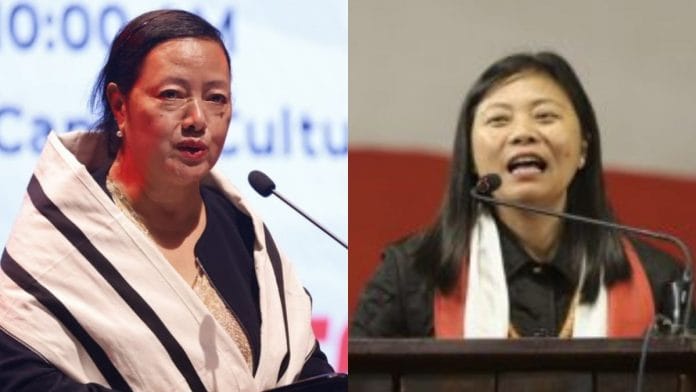This is a fight for women. It’s sad that Nagaland is the only state where women have not been given a place in the highest decision making body — the assembly,” Nationalist Democratic Progressive Party candidate Hekani Jakhalu had said in a recent interview before the results of Nagaland assembly election were announced. Now, she has become one of the two women MLAs from Nagaland in its 70-year history. Jakhalu won from Nagaland’s Dimapur-III seat defeating Lok Janshakti Party’s Azheto Zhimomi by 1536 votes. She is joined by Salhoutuono Kruse who defeated independent candidate Keneizhakho Nakhro by 7 votes in Western Angami constituency. Their win has emerged as a beacon of hope for the representation of women in electoral politics, but is also a grim reminder of the inequalities still existing in the political landscape in some of the remote states, specially in the Northeast.
The Northeastern states of India have traditionally seen low representation of women in politics due to various social, cultural, and economic factors. Interestingly, village councils have more women members but their contribution is limited to patriarchal roles, as reported by ThePrint earlier. The victories of Hekani and Kurse are a symbol of gradual progress and inclusivity in the political landscape. Their win could lead to more women being encouraged to join politics and help create a more balanced political representation in the future. Even Prime Minister Narendra Modi, in his speech to party workers after the results, hailed the victory of the women MLAs, stressing on how his party was committed to woman empowerment, and that is why these two new elected representatives from Nagaland are ThePrint’s Newsmakers of the Week.
Nagaland women in politics, society
The data on female literacy from Nagaland may not reflect why fewer women participate in politics, as the state has a fairly good literacy rate of 76.10 per cent compared to men’s (82.8 per cent), according to the 2011 Census. However, the work participation of women in Nagaland is just 52.3 per cent in rural regions, and even lower — 25.9 per cent — in urban areas. The total participation Rate is 44.7 per cent for females and 53.4 per cent for males. Dimapur, the constituency Hekani belongs to, is at the lowest rank in terms of female workforce participation.
Last year, the government gave green signal to the 33 per cent reservation bill for women in local civic bodies. The Municipal Act of 2001 was amended in 2006 to insert the reservation which could not be implemented due to opposition from tribal groups.
However, the reason not many women enter politics in Nagaland is because they are not provided tickets due to low rates of winning, according to political analysts.
As per Ashoka University’s Trivedi Center for Political Data, 21 women candidates fought various assembly elections and bypolls In Nagaland, as opposed to 2,336 male candidates — which is not even one per cent. In the 2018 assembly election, out of 196 candidates, five were female. This time, of the total 183 candidates, three were women. However, last year in March, Nagaland had got its first Rajya Sabha MP — S Phangnon Konyak — supported by the BJP. Before her, Rano Shazia was the only woman MP who had secured her seat in the Lok Sabha by defeating then-chief minister Hokishe Sema in 1977.
Also read: Meghalaya’s matriliny doesn’t help gender equality, fares poorly on Northeast SDG index
Women with social bent of mind
Jakhalu is everything a promising political candidate can be described as — well-educated, comparatively young, and a background in social services. She studied at Delhi’s prestigious Shri Ram College of Commerce and obtained a degree in law. Then she went to the University of San Francisco for her LLM. She worked both at the Supreme Court and the Delhi High Court. She quit her position as a partner at a law firm and returned to India in 2006 and founded YouthNet, a non-profit organisation that aids students in knowledge and skill development. She was also awarded the Nari Shakti Puruskar in 2018 by then-President Ram Nath Kovind.
Kruse has also been active in civil society organisations and has worked with NGOs. She also headed a tribal women’s body named Angamimiapfu Mechu Krotho. She is a hotel owner and the wife of late NDPP candidate Kevisekho Kruse.
This was their debut election and their campaigns focused on youth, rights of minorities, women and skill development. Jakhaklu wants to make Dimapur III a model constituency. In a recent interview, she had mentioned how half of her constituency includes non-Nagas and those who get elected, usually forget the minorities after getting the votes.
“If I go out of Nagaland, I am also a minority. Non-Naga people are neglected when the legislators win. My constituency also lacks many basic amenities. I want to focus on making a model constituency. Youth is also looking for employment and solutions to our political problems, which will hopefully be resolved soon,” she said in an interview to Sansad TV.
Jakhalu said that tribals are indigenous people and the mindset is usually patriarchal, which is why many women have not been able to participate in politics. But she observed that during her campaigning, she saw people were more accepting. People of Nagaland are ready to see women in politics, she said.
Kurse too strongly believes in the idea of equal representation of urban and rural areas, women empowerment and improving the quality of life of the people of her constituency. Both these women have greater challenges ahead of them — to survive and thrive in a heavily male-dominated assembly and make their voices heard.
Views are personal.
(Edited by Prashant)






